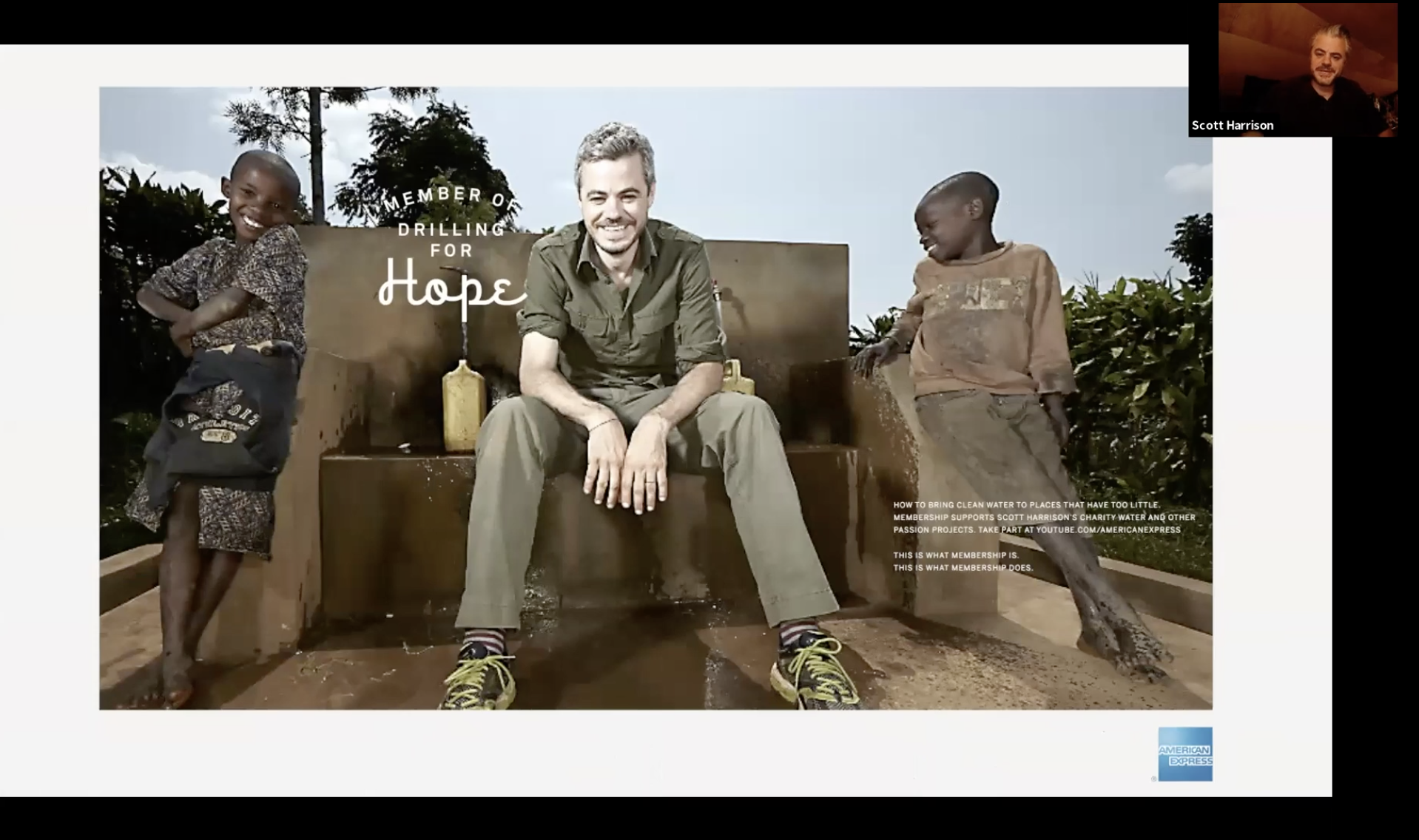Scott Harrison, founder and CEO of charity: water, delivered the C. Ashton Newhall Endowed Lecture virtually on Wednesday, Oct. 28.
When Scott Harrison launched his nonprofit charity: water, he drew on experience he gained as a nightclub promoter in his 20s to throw a party, with 700 attendees paying $20 at the door. It was a party that would raise $15,000, with 100 percent of that funding put to work developing clean water projects at a refugee camp in Northern Uganda.

“Then we sent the photos and GPS coordinates of the projects back to those 700 people, and said — you did this,” Harrison told members of the Elon community as he delivered the C. Ashton Newhall Endowed Lecture remotely. “You gave $20, and we collected it and here are people were so blown away that a charity would repot back to them on such a small gift. They said, ‘When’s the next event? How do we bring our friends? How do we give more?’ And we really knew that we were on to something.”
That was $475 million in donations to Harrison’s Charity Water nonprofit and 14 years ago, with that money funding 56,000 clean water projects in 29 countries since that first party. During his Oct. 28 talk, described how his passion for providing access to clean water to the millions around the globe who lack it developed, as he did an about-face with his life as a nightclub promoter to become a volunteer on a hospital ship off the coast of war-torn Liberia. It was an experience that brought into focus his goal to help meet this elemental need for so many.
“Nothing is more powerful than clean water,” Harrison told the students, faculty and staff who gathered with him online for the talk. “It’s an amazing moment when kids see clean water for the first time in their life. There’s splashing. There’s dancing. There’s so much joy. We don’t actually have a slogan, but if we did, it would be, ‘Water changes everything.’ We believe water is the most transformative substance, the most transformative agent on Earth.”
The C. Ashton Newhall Endowed Lecture Series, named for Elon University trustee C. Ashton Newhall ’98 and hosted by the Doherty Center for Creativity, Innovation and Entrepreneurship, brings successful entrepreneurs to campus to share their knowledge and experience managing the risks and rewards of entrepreneurial endeavors.
During the course of the 90-minute event, Harrison explained how he built the nonprofit on three pillars that he believes have been major contributors to the success it has seen through the years.
First, charity: water is dedicated to using 100 percent of its public donations to directly fund water projects. The overhead costs for the nonprofit itself are funded by contributions from a small group of private donors, board members and sponsors so that 100 percent of the publicly raised money can go directly to projects. Harrison said he resolved to use this model after realizing that there is widespread mistrust in charities, with many believing that charities waste contributions.
“I thought this was a huge opportunity,” Harrison said.
Second, Harrison said charity: water has used technology to show its donors the impact that their contributions are having. Just like it did with the messaging to those who attended that first party, charity: water is very open with how and where donations are spent, Harrison said.
“We were the first charity to put every project we ever funded on Google Earth and Google Maps,” Harrison said. “People could see the satellite images and pictures of every single well that we ever built, every gravity-fed system or spring protection or biosand filter. Whatever the technology was, they could see it, they can know where the money was going.”
Lastly, charity: water has provided the resources and support for these projects, but the projects themselves are led by those in the local communities. “No guy like me should be running around with a hard hat in Malawi or Kenya or India barking orders to a local team,” Harrison said.
It’s important to empower local communities to take the lead in these projects, and such an approach will pay long-term dividends, he said. “Winning would look like people not even knowing who charity: water was in a country where maybe we would invest millions and millions of dollars, but knowing and celebrating our local partners there who would receive the funding and turn it into clean water,” Harrison said.
It’s been a wildly successful strategy. Last year, charity: water raised more than $90 million and through its 14 years, more than 1 million people from 144 countries have contributed to its mission. Many of its wells are now outfitted with sensors that provide data about its impact and functionality. A range of leaders from the fields of technology, sports, entertainment and other industries have signed on to support charity: water’s overhead costs.
“That’s allowed us to now serve over 11 million people with access to clean water,” Harrison said. “And I really believe the best is yet to come.”
Harrison said to mark the 14th birthday of charity: water, he visited the first well it installed in the refugee camp in Uganda. Though it’s a been banged up a bit, it’s still functioning. “That handle has been pumped more than 14 million times, which is just amazing, producing over 10 million liters of water,” Harrison said.
Harrison was introduced by Doherty Center interns Lily Santiago ’22 and Aisling Sullivan, and a Q&A session to close out the talk was moderated by Doherty Center Director Alyssa Martina.
Elon students, faculty and staff are invited to watch a recording of Harrison’s talk here.



